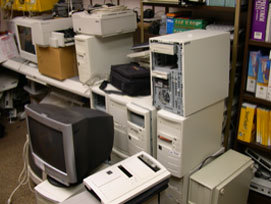 "Is this campus tech support?," the caller said before Michael even had a chance to say hello, "I hope this isn't a recording because we have a serious problem with one of the detectors here. It won't open files!!"
"Is this campus tech support?," the caller said before Michael even had a chance to say hello, "I hope this isn't a recording because we have a serious problem with one of the detectors here. It won't open files!!"
Used to working with the frantically confused user, Michael replied in a calming voice, "Now calm down, let's start out with your user id and—"
"THERE'S NO TIME FOR THOSE STUPID FORMALITIES!" the caller barked, "just make your way over to G-Building and go to B2. I'll meet you when you arrive. And, hurry!"
After the user hung up, Michael just stared at the receiver for a second before replacing it. G-Building was the chemistry department's and the basement levels (especially B2) was where the university had their real labs. The ones where all the researchers produced results that got published in various scientific journals.
Beside the fact that the entire building had their own dedicated support staff as a result of the occasional semi-secret stuff they did over there, it was 10:30 PM on a Sunday and they were calling about a problem with a... detector? That somehow wasn't able to open files?
Ordinarily, Michael would have deferred to a senior technician, but because of the late hour and the urgency in the caller's voice, he decided to go ahead and check into the problem himself. Michael prepared himself to face either the worst disaster... or the most outlandish IT related prank of his college career.
Getting Down and Dirty
As the elevator doors opened, Michael finally met — or rather, was seized by — his frantic caller, a bookish grad student in his late-20s named Jeffrey. "Thank goodness you're here," he huffed, "the lab's right around the bend, follow me!"
Michael had never been in the B2 level of Building-G and, as he followed Jeffrey, he started to wonder if that was a good thing. The dimly-lit, labyrinth-like corridors were lined with the occasional bright-red drum bearing various warnings with skull-and-crossbones insignia.
As they turned the corner towards another hallway with flickering and humming florescent lights, a large overhead sign flashed CONTAMINATED over and over again. "Don’t worry about that," Jeffrey said casually, "that's just the alpha radiation detector. It's been malfunctioning all week." It wasn't all that reassuring.
A few moments later, they arrived at a vault-like steel door labeled “Nuclide Laboratory.” The door opened with a loud creaking noise and revealed little more than a shabby room that seemed to double as a depot for discarded technology. Amidst the 386s and handful of Commodore 64s, another graduate student was sitting down, working on some papers.
Jeffrey explained that he and his lab mate were working on their dissertation which involved something about the detection of nuclear materials inside of a shipping container. During the course of several weeks, they had amassed all the data they would need, but had no way of retrieving it because the crotchety installation of Windows NT simply refused to recognize their USB pen drive. With their lab time running out, and no way to get their data off the PC, they were in panic mode.
After settling in, Michael recognized the computer immediately – it was a fairly vanilla model from about 8 years ago that he had owned before college. It had onboard USB and a good ol' Ethernet card. Piece of cake, he figured, however...it wasn't.
For starters, so far as he could tell, the installation of Windows NT4 on this particular gem was completely virgin and without any of the Service Packs applied. The maximum resolution was trapped at a visually nauseating 640x480x16, and, worse still, as indicated by a handful of error pop-ups after booting that basically said "Hey buddy! You've got the wrong device drivers installed!" the OS appeared to have been a forced transplant into the computer after first being installed on another PC.
Obit Cum Tessera
Although there was no access to the university’s network within the bowels of Building-G, Michael came prepared with a netbook PC and an Ethernet patch cable. He figured that at the very least it MUST have a working network card and that he’d be in and out with no issues, but instead, he quickly discarded that idea.
He attempted to run a hardware scan, but noticed that his login did not have administrative privileges. Fortunately, the Building-G network administrator was on call, so Michael dialed him up to get the system’s admin account.
"I have absolutely no idea," the network administrator confessed, "I didn't even realize that mutant NT PC even existed."
"Well then," Michael countered, "would you mind if I 'cracked the case' and take the hard drive back to the office and..."
The admin cut Michael off, "Actually, no offense, but I do mind" and went on further to explain that a lot of the equipment down there was held together with duct tape and wire (sometimes, quite literally), and was known to be "uniquely sensitive". "Moreover," he said in a hushed whisper, "when your primary users are semi-paranoid, fully tenured professors, having equipment (even temporarily) disappear, or worse, appear different - you can find how far clout can carry and make your life difficult and make your job disappear."
Instead, he advised Michael to contact the former Building-G admin: a recently-retired professor who likely still lived in the area. "Chances are," he added, "that old coot will remember the password."
However, there was a problem with the admin’s suggestion - Michael had attended the professor's funeral two weeks earlier.
Brute Force Tactics
Having neither a Ouija board nor a shovel, Michael was down to very few options and even less patience. The first and most obvious solution was to use his trusty Knoppix boot CD to extract the files off the NTFS drive, but some sort of strange, third-party encryption pretty much eliminated that option. One way or another, he'd have to login to the admin account.
Frustrated, Michael returned to the tech support offices and looked for alternate solutions. After some quick Googling found himself a promising, and very "L337 HAX0R" sounding, solution - he would use the Knoppix boot CD to download the password registry from the old PC, crack the admin pasword, and nurse it to health enough to pull the files off!
After burning the CD, he rushed back to the lab, pulled the password files off of the hard disk and took them home. Eager that the solution he found, so elegant in its simplicity, would help him, Michael started in with some of the dictionaries and rainbow tables (including some crazy foreign language ones). Nothing. Then it dawned on him - since the professor was likely an absolute genius (he was a nuclear scientist, for crying out loud) - the password was likely L&28A34G#$%GH1 or worse, something insane that somehow used non-printable ASCII characters. Finally feeling beaten and defeated, Michael figured he was at last out of options and decided, What the hell..With any luck, maybe it'll be done by next term, and put his computer to brute-forcing the >10 character password and went to sleep.
The next morning, Michael turned on his monitor was surprised, or perhaps shocked, to actually find the password displayed in the cracking software. What would be the lost admin password, what would be the code that he had, in a manner of speaking, pulled from the dead professor's head?
It was pretty simple: "spiderman911".
As quickly as possible, Michael gathered together all the NT patches and drivers he could think of, burned them onto a few CDs and raced to the Chemistry building. But this time, when Jeffrey let him through the B2 level, the grungy halls and rooms were filled with dozens of professors and grad students frantically working on their projects.
Remembering the lab admin describing the "peculiar" and regular users, Michael paused and decided not to install the updates Instead, he pulled out his Knoppix CD and booted up, and downloaded the data files onto the USB pen drive.
Before leaving, Michael decided to anonymously leave the CD on the computer desk with a short note describing how he had used it to save the data onto the USB drive. Hopefully, it'd come in handy for the next poor soul who needed to use a virtual crowbar to pry their data out of the dead professor's computer.

